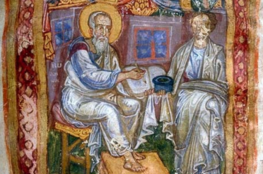There’s more to online life than this blog. I promise.
- Christopher Ferrara, “The Rise of Bergoglianism,” The Remnant – A few months ago Michael Voris made some waves by declaring he would not openly criticize Pope Francis. By doing so, he consciously drew a line in the sand between himself and other traditional Catholics, including Christopher Ferrara. An article such as this may be one reason why. Not that I am faulting Ferrara. I have come to believe that the neo-Catholic culture which still dominates today is far too thin-skinned for its — or the Church’s — own good. While some of Ferrara’s formulations may may be a wee bit too high-charged, is there anything factually incorrect in the piece? Can anyone say with a straight face that the Church is still on the same path it was on under Pope-Emeritus Benedict XVI? Even Fr. John Zuhlsdorf has dropped his call to “Read Francis Through Benedict.” I wonder why.
- Andrew Haines, “Pope Francis is a Toxic Asset,” Ethika Politika – On the exact opposite end of the spectrum from Ferrara, at least with respect to Pope Francis’s reign, is Andrew Haines, editor of Ethika Politika. His latest is a puzzling piece insofar as the author seems to believe that criticizing Francis is to put oneself at odds with the Gospel. True, trying to interpret Francis through an “-ism” isn’t very helpful, which is why I am far less concerned with the liberal, libertarian, neo-Catholic, etc. take on Francis is and more curious about how he aligns with his predecessors and where his concrete actions and words either affirm or diverge from the age-old doctrine and praxis of the Catholic Church. This notion that Francis is “above” or “beyond” all of that is a smokescreen. If he is truly doing something “new” (a debatable point), that hardly means that it is good.
- Eric Posner, “Eric Holder’s Legacy,” Slate – Eric Posner finally has an opportunity to summarize what he’s been saying for several years now: Obama era policies concerning civil liberties, the constitutional power of the executive, and the so-called “War on Terror” are just extensions of those begun under Bush II. Holder exited his role as Attorney General hoping to be lauded for his civil rights record (which focused almost exclusively on homosexuals). But as Posner observers, his overall record with respect to civil rights is a manifest failure.
- John Webster, “Ecclesiocentrism,” First Things – This article is actually a review of Nicholas Healy’s compelling book, Hauerwas: A (Very) Critical Introduction. I’ll reserve comment and let Webster speak for himself (while also, of course, summarizing Healy). Whatever you might think of the review, Healy’s book is well worth reading.



